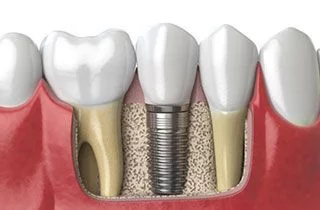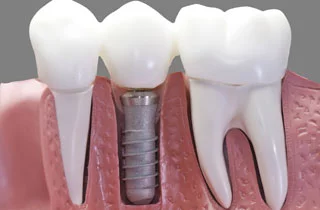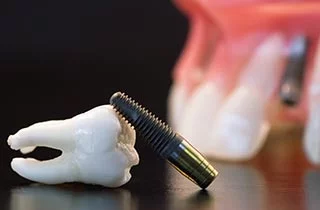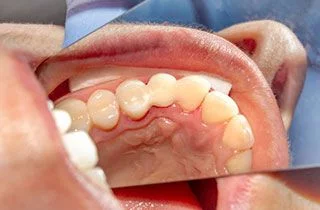Although the success rate of implantations is quite high, over 90%, problems can occur. Even these modern dental prostheses can become damaged. The implant can become loose, the screw that holds the abutment can break or unscrew. In very rare cases, it can happen that the artificial tooth root breaks. If a problem arises with the artificial teeth, one should not despair. In most cases, modern dentistry can save the implants and dental prostheses. This article is aimed at anyone who wants to know how to prevent or treat problems with dental implants.
In this article, you will read about the following topics:

- What are the risks of implantation?
- The rejection of implants and its signs
- Breakage of the implant
- Defects of the superstructure
- Causes for a cracked or broken implant
- Can you remove a dental implant and replace it?
- Suggestions to avoid problems
What are the risks of implantation?
Implants that are implanted into the jawbone remain firmly and permanently anchored in more than 90% of cases. This allows them to hold abutments and withstand biting force. Very rarely, the implant can become loose, wobble, or fall out. Causes of this rare phenomenon:
- insufficient extent of ossification, therefore the implant’s imperfect integration into the jaw bone
- inflammation of the soft and hard tissues surrounding the implant
- insufficient amount of bone material
- shifting effects resulting from early overload, loosening of connection to the bone
- inadequate primary stability during implantation into the jaw bone
- imprecise surgical intervention
- smoking
- neglecting necessary oral hygiene (even more strict in this case), non-compliance of instructions
No matter what is behind the loosening of the implant, loosened artificial tooth roots cannot be “refixed.” Moving implants have little or no contact with the jawbone. This condition can only be healed by implanting a new implant. Moving, loose artificial tooth roots must be removed as quickly as possible. Only then, when the condition of the bone, gums, and oral cavity allows, can a new implant be implanted. Before the new implantation, jawbone augmentation may be necessary, possibly also a sinus lift .
The rejection of implants and its signs
The implantation is successful when the osseointegration in the area of the artificial root placed in the jaw is complete and thus the placed tooth can bear load. In this case, the healing, apart from the slight bleeding that is normal after surgery, from minor pain and swelling, usually proceeds smoothly and without problems. More from Dental implant risks, and Dental Implants Pros and Cons
An unsuccessful implantation always has warning signs. In this part, these symptoms are listed:
Returning gingivitis
The main cause of an unsuccessful implantation is recurring gum inflammation around the implant.
The external symptoms of the disease are bright redness and bleeding of the mucous membrane, swelling of the gums, fever or elevated temperature.
Regular pain
Stronger or constantly recurring, stabbing pain can also be warning signs of the rejection of the implant.
The mobility of dentures
The non-fixed, wobbly dental prosthesis is often an indication of inflammation.
After the implantation, the surgical area should only be loaded carefully. If you have followed the prescribed instructions but still feel that the implant is not secure, be sure to contact your treating doctor to have the necessary examinations performed.
Other symptoms
Rare symptoms include secretion when pressure is applied to the gums, suppuration, sinusitis, or mucositis, which occurs in cancer diseases.
If you notice anything suspicious, it is highly recommended to consult your treating physician to avoid possible complications.
With timely diagnosis, the process can be reversible.
Breakage of the implant
There are very few examples of implants that were fixed in the jawbone breaking. (There are somewhat more examples of abutment and screw fractures.) With today’s modern implants, this problem rarely occurs. However, errors can occur during manufacturing, or during placement and use. The following main causes can lead to implant fractures and cracks:
- manufacturing or material defect
- imperfect integration into teeth structure, malpositioned implant
- physical or biomechanical overload
 Physical overload can cause external force effects on the jawbone and oral cavity (e.g., accident). An example of biomechanical overload is constant teeth grinding.
Physical overload can cause external force effects on the jawbone and oral cavity (e.g., accident). An example of biomechanical overload is constant teeth grinding.
No matter what leads to the implant fracture, the broken implant must be replaced. However, the implantation of a new artificial tooth root is considered a new implantation. When calculating the total restoration time, a new osseointegration period of 3-6 months must be taken into account.
Defects of the superstructure
Defects of abutments that are screwed into the implants can be treated more easily than defects of the implants themselves. Generally, they can be repaired on-site without a long healing process.

The screw that holds the abutment of the implant can unscrew. In this case, the patient feels that their dental prosthesis is becoming unstable and wobbling. If it has not yet come to a fracture or crack, the fixation screw can be tightened and thus the problem remedied.
The problem is greater if the abutment screw is broken or has split. In this case, the screw must either be removed and replaced immediately or repaired on-site. The fracture of the fixation screw is a major problem because some deformed pieces can get stuck in the implant and can only be removed with difficulty.
Causes for a cracked or broken implant
Only in a small number of implantations does it happen that the screw that fixes the abutment splits or breaks. The phenomenon can have many causes, including material defects. However, the following problems are typical:
- The tooth replacement does not fit in the teeth perfectly. During chewing and biting extensive external forces weaken the superstructure and the fixation screw.
- The surgeon that carries out the implantation does not adjust the axis of the artificial root perfectly.
- Negligence and carelessness of the patient. Instead of seeking medical care in case of a loosened implant, some people wait until it is cracked or broken.
Can you remove a dental implant and replace it?
Yes, replacing a dental implant is entirely possible. The process of implant replacement:
Removal of the old implant: A damaged or loose implant is removed through a minor surgical procedure. Healing phase: The jawbone must heal after the removal of the implant before a new one can be placed. Insertion of the new implant: After the healing phase, the new implant is placed and fuses with the jawbone. Crown or bridge: Once the implant is firmly connected to the bone, the final dental crown or bridge is attached.
How painful is the removal of a dental implant?
The removal of dental implants is usually performed under local anesthesia, so you should not feel any pain during the procedure. However, after the treatment, there may be slight pain or pressure sensations that can be easily treated with painkillers.
Suggestions to avoid problems
To be able to wear your implants with satisfaction for a long time, you must follow some basic rules:
- You should have the implantation carried out by a dental expert who has significant and verifiable experience in this field. It is important that this expert is assisted by a complex team.
- Follow the instructions of your doctor during the first phase of implantation carefully.
- Avoid overloading the implant during the ossification period! Start using your implant gradually, according to your doctor’s instructions, even when osseointegration is complete.
 It is very important to prevent inflammation around the implant. Therefore, dental prostheses and the area around the artificial roots must be cleaned exceptionally thoroughly. If this is not observed, a rapidly progressing inflammation, peri-implantitis, can occur around the artificial root.
It is very important to prevent inflammation around the implant. Therefore, dental prostheses and the area around the artificial roots must be cleaned exceptionally thoroughly. If this is not observed, a rapidly progressing inflammation, peri-implantitis, can occur around the artificial root.
The implant can become loose or, at the end of this process, fall out. In addition to daily brushing, professional dental cleaning is occasionally necessary.
Furthermore, it is very important to see your dentist immediately if you notice even a slight deviation around the implants. Bad taste in the mouth or pain could indicate a problem. Please consult your dentist for further clarification.
If you take the first symptoms seriously and go to the doctor, the development of serious problems can be prevented in many cases. What about dental implants with diabetes? Let me see our Dental Implants Before/After Photos,and Costs for Dental Implants.


